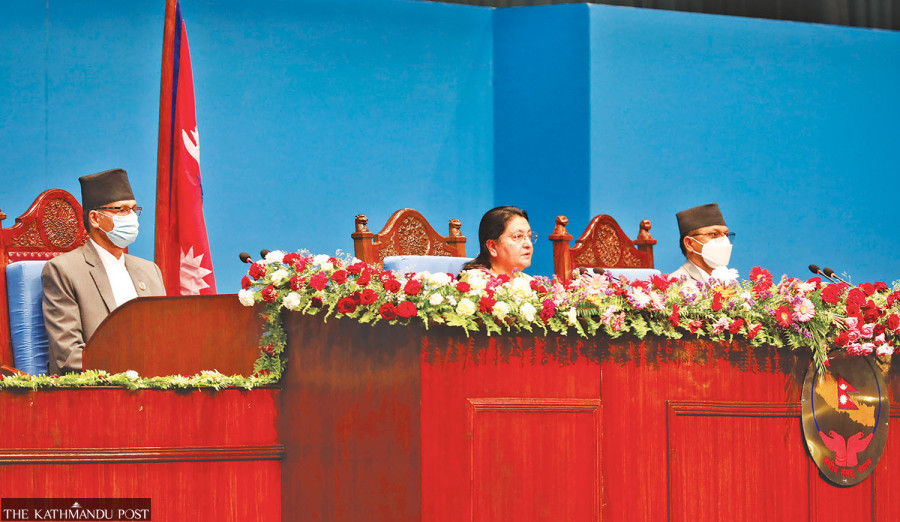National
Government to promote industrial production and electricity use
Policies and programmes document for new fiscal year says a special scheme will be launched to boost production of paddy, maize, potato, onion, apple and walnut.
Prithvi Man Shrestha
With the economic vulnerability of the country increasing along with rising imports, the government is coming up with measures to boost domestic production and consumption and promote exports.
Presenting the government’s policies and programmes for the fiscal year 2022-23 at a joint session of both houses of parliament on Tuesday, President Bidya Devi Bhandari said the government would ensure economic stability through coordination between fiscal and monetary policies.
“An economic policy will be adopted to help the country withstand risks from internal and external factors,” the policies and programmes state.
Currently, the country’s ability to buy foreign goods and services has been constrained due to depleting foreign exchange reserves as a result of surging imports while sources of the foreign exchange earnings such as remittances have decreased and the limited earnings from tourism and exports failed to make up for the losses of foreign exchanges in imports.
As of the first 10 months of the current fiscal year, Nepal’s import bill reached as high as Rs1604.65 billion while export earnings stood at Rs173.34 billion, according to the Department of Customs.
Fearing the country could turn into another Sri Lanka, the government and the central bank have taken a number of measures to control imports.
In late April, the government imposed a complete ban on 10 types of goods including vehicles, liquors, readymade cigarettes and tobacco products, and snacks like Lay’s potato chips and Kurkure, diamond, excluding those used as industrial raw materials, mobile sets that are worth more than $600 and colour televisions over 32 inches.
Bhandari said that the government would introduce a decade-long campaign titled “Domestic Production and Consumption Increment Campaign” to expand the market of Nepali goods.
To make the campaign successful, Prime Minister Nepali Production and Consumption Increment Programme will be implemented. “For this purpose, the government will provide concessions on taxes and customs duties and provide incentives on exports,” President Bhandari said.
“The government will also support the private sector’s ‘Make in Nepal’ and ‘Made in Nepal’ campaigns as well, according to her. “The share of domestic goods in public procurement will also be increased.”
Likewise, the government will also launch the ‘Farm to Industry,’ a unified model programme, to connect the agriculture, forest and mine products with the relevant processing industry, according to the policies and programmes.
Nepal has been increasingly reliant on imports not only for intermediate or finished industrial products but also for primary agriculture products contributing to massive rise in the import bill.
Not only rice, Nepal is importing a whopping amount of cereals; in the first three quarters of this fiscal, the country imported cereals worth nearly Rs62 billion, making the grains the fifth largest import item of the country, according to the data from the Trade and Export Promotion Centre (TEPC).
As per the policies and the programmes of the government, the government will launch a special programme to increase production of paddy, maize, potato, onion, apple and walnut which are being imported in large scale.
“The government will ensure import of chemical fertilisers,” President Bhandari said amid concerns whether fertilisers would be available because of its shortage globally and skyrocketing prices in the backdrop of the ongoing Russia-Ukraine war.
Farmers opting for organic farming will be provided subsidies in the purchase of organic fertiliser equivalent to that in chemical fertiliser, according to the policies and the programmes.
One of the biggest factors behind surging imports is the ballooning import bill of petroleum products. During the first 10 months of this fiscal, Nepal imported petroleum products worth around Rs243 billion, according to the customs department. The country imported cooking gas alone worth Rs52 billion.
As per the policies and programmes, the government will promote the use of electricity in the kitchen and promote electric vehicles.
“In order to increase consumption of electricity and gradually displace cooking gas in the kitchen, the existing electricity tariff will be reviewed,” said Bhandari.
In order to encourage the use of electric ovens and other electrical goods in the kitchen, the Electricity Regulatory Commission had reduced the electricity tariff for households that use 150 units to 250 units per month by 50 paisa per unit to Rs9.50, starting from November 17.
In order to promote electric vehicles, the government will also set up electric charging stations with the participation of the private sector.




 20.12°C Kathmandu
20.12°C Kathmandu














